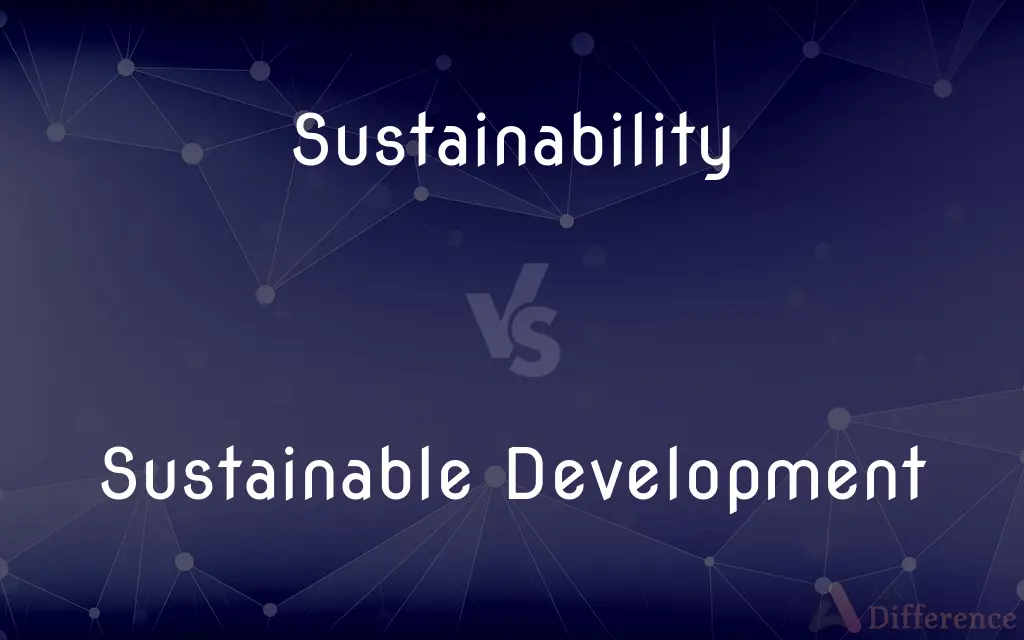Sustainability vs. Sustainable Development — What's the Difference?
By Maham Liaqat & Fiza Rafique — Published on February 20, 2024
Sustainability is the practice of maintaining resources without depletion. Sustainable Development focuses on meeting current needs without compromising future generations' ability to meet theirs.

Difference Between Sustainability and Sustainable Development
Table of Contents
ADVERTISEMENT
Key Differences
Sustainability refers to the ability to maintain or preserve resources at a certain rate or level over time. It encompasses a broad range of practices and principles aimed at ensuring the long-term viability and health of natural and human systems. Sustainability seeks to balance ecological, economic, and social needs, allowing for the harmonious coexistence of humans and the environment. The concept encourages responsible interaction with the planet to avoid depletion or degradation of natural resources, ensuring that future generations inherit a healthy world.
Sustainable Development, as defined by the United Nations Brundtland Commission in 1987, is "development that meets the needs of the present without compromising the ability of future generations to meet their own needs." This concept builds on the principles of sustainability by adding a developmental perspective, focusing on achieving long-term economic growth in harmony with environmental stewardship. Sustainable Development involves implementing strategies that integrate environmental, economic, and social goals, aiming for a balanced approach to development that ensures progress does not harm the planet.
The main difference between sustainability and sustainable development lies in their scope and application. Sustainability is a broad goal or state that seeks to ensure the long-term preservation and health of resources and ecosystems. In contrast, sustainable development is a proactive approach or strategy that seeks to achieve economic, social, and environmental progress simultaneously, ensuring such progress is both inclusive and ecologically sound.
Sustainability serves as the foundation upon which sustainable development builds. While sustainability focuses on the conservation of resources, sustainable development emphasizes the integration of this conservation into planning and growth initiatives. Both concepts are interdependent, with sustainable development acting as the pathway through which sustainability goals can be achieved.
In essence, sustainability is about maintaining balance and avoiding resource depletion, while sustainable development is about integrating this balance into practical growth strategies. Both are crucial for ensuring a healthy, viable planet for future generations, but they operate at different levels of action and strategy.
ADVERTISEMENT
Comparison Chart
Definition
Practice of maintaining resources
Development meeting present and future needs
Focus
Conservation and long-term viability
Economic growth with environmental stewardship
Scope
Broad, encompassing various practices
Specific strategies for progress
Goal
To avoid depletion of natural resources
To achieve progress in harmony with nature
Application
General approach to resource use
Integrated approach to planning and development
Compare with Definitions
Sustainability
Balancing ecological, economic, and social needs.
Green building practices contribute to sustainability by reducing waste.
Sustainable Development
Development that ensures economic growth without harming the environment.
Sustainable development initiatives support solar power to reduce fossil fuel use.
Sustainability
Minimizing environmental impact through responsible actions.
Using renewable energy sources is key to sustainability.
Sustainable Development
Integrating environmental goals with community needs and economic strategies.
Urban planning that includes green spaces exemplifies sustainable development.
Sustainability
Ensuring resources remain available for future generations.
Sustainability in fishing ensures ocean health and food security.
Sustainable Development
Utilizing renewable resources to meet current and future demands.
Wind farms represent a commitment to sustainable development by providing clean energy.
Sustainability
Capable of being sustained.
Sustainable Development
Promoting technologies that do not deplete resources for future generations.
Investing in sustainable agriculture practices supports sustainable development.
Sustainability
Capable of being continued with minimal long-term effect on the environment
Sustainable agriculture.
Sustainable Development
Achieving social equity along with economic and environmental sustainability.
Affordable clean water projects are crucial for sustainable development.
Sustainability
The ability to sustain something.
Sustainability
(ecology) A means of configuring civilization and human activity so that society, its members and its economies are able to meet their needs and express their greatest potential in the present, while preserving biodiversity and natural ecosystems, planning and acting for the ability to maintain these necessary resources for future generations.
Sustainability
(business) The ability to sustain a business in the long term, which is a state that is partly dependent on, but broader than, profitability today or in the short term; it involves aspects of a plausible path toward eventual profitability (as applies to a startup) and ecologic sustainability (for example, the long-term dependence of the timber/lumber industry on forest preservation and renewal, or of fisheries on viable fish stocks).
The making of buggy whips is the proverbial exemplar of a business without sustainability in the face of technological change.
Sustainability
(civics) The ability to sustain a civic practice or process in the long term, such as democracy, entrepreneurialism, a war effort, or others.
Universal primary and secondary education, without which the sustainability of innovation and entrepreneurialism seems questionable
Sustainability
The property of being sustainable
Sustainability
Preserving natural habitats and biodiversity.
Conservation efforts are essential for the sustainability of wildlife.
Sustainability
Reducing carbon footprint and mitigating climate change.
Sustainability involves lowering emissions through innovation and efficiency.
Common Curiosities
Why is sustainability important?
To ensure the long-term health and availability of the Earth's resources.
Is renewable energy a part of sustainability?
Yes, it's crucial for reducing dependence on finite resources and mitigating climate change.
Can sustainable development lead to economic opportunities?
Yes, it can drive innovation, create jobs in green industries, and open new markets.
How does sustainable development differ from traditional development?
It incorporates environmental protection and social equity into economic growth strategies.
Can sustainability be achieved globally?
Yes, through collective efforts and responsible policies aimed at conserving resources.
What are the key components of sustainable development?
Economic growth, environmental protection, and social equity.
How can businesses contribute to sustainability?
By adopting green practices and reducing waste and emissions.
What role do governments play in sustainable development?
Implementing policies that encourage sustainable practices and regulate harmful activities.
How can individuals contribute to sustainability?
Through conscious consumption, recycling, and supporting sustainable products and practices.
What challenges face sustainable development?
Economic disparities, political will, and technological access among others.
What is the role of technology in achieving sustainability?
Technology can provide solutions for clean energy, efficient resource use, and reducing environmental impact.
What is the ultimate goal of both sustainability and sustainable development?
To create a balanced and equitable world where human activities do not compromise the Earth's ability to sustain life in the future.
Are sustainability and sustainable development achievable in the short term?
While immediate actions can be taken, these are long-term goals requiring ongoing effort.
How do education and awareness contribute to sustainability?
They empower people to make informed decisions that support sustainable outcomes.
How do sustainability and sustainable development benefit society?
They lead to healthier environments, social well-being, and economic resilience.
Share Your Discovery

Previous Comparison
Hulk vs. Incredible Hulk
Next Comparison
Anionic Surfactants vs. Non-Ionic SurfactantsAuthor Spotlight
Written by
Maham LiaqatCo-written by
Fiza RafiqueFiza Rafique is a skilled content writer at AskDifference.com, where she meticulously refines and enhances written pieces. Drawing from her vast editorial expertise, Fiza ensures clarity, accuracy, and precision in every article. Passionate about language, she continually seeks to elevate the quality of content for readers worldwide.













































